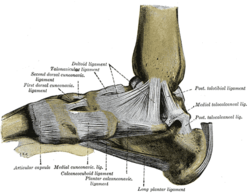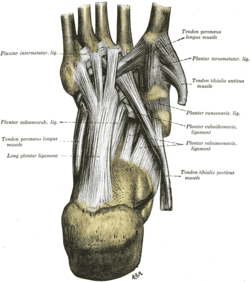- Cuneonavicular articulation
-
Cuneonavicular articulation 
Ligaments of the medial aspect of the foot. (Cuneonavicular articulations labeled at upper left.) 
Ligaments of the sole of the foot, with the tendons of the Peronæus longus, Tibialis posterior and Tibialis anterior muscles. (Cuneonavicular articulations labeled at center right.) Latin articulatio cuneonavicularis Gray's subject #96 356 Cuneonavicular Articulation (articulation of the navicular with the cuneiform bones).—The navicular is connected to the three cuneiform bones by dorsal and plantar ligaments.
Contents
The Dorsal Ligaments
The dorsal ligaments are three small bundles, one attached to each of the cuneiform bones.
The bundle connecting the navicular with the first cuneiform is continuous around the medial side of the articulation with the plantar ligament which unites these two bones.
The Plantar Ligaments
The plantar ligaments have a similar arrangement to the dorsal, and are strengthened by slips from the tendon of the Tibialis posterior.
Synovial Membrane
The synovial membrane of these joints is part of the great tarsal synovial membrane.
Movements
Mere gliding movements are permitted between the navicular and cuneiform bones.
This article was originally based on an entry from a public domain edition of Gray's Anatomy. As such, some of the information contained within it may be outdated.
Joints and ligaments of lower limbs (TA A03.6, GA 3.333) Coxal/hip femoral (iliofemoral, pubofemoral, ischiofemoral) · head of femur · transverse acetabular · acetabular labrum · capsule · zona orbicularisKnee-joint TibiofemoralCapsule · Anterior meniscofemoral ligament · Posterior meniscofemoral ligament
extracapsular: popliteal (oblique, arcuate) · collateral (medial/tibial, fibular/lateral)
intracapsular: cruciate (anterior, posterior) · menisci (medial, lateral) · transversePatellofemoralTibiofibular Superior tibiofibularInferior tibiofibularJoints of foot medial: medial of talocrural joint/deltoid (anterior tibiotalar, posterior tibiotalar, tibiocalcaneal, tibionavicular)
lateral: lateral collateral of ankle joint (anterior talofibular, posterior talofibular, calcaneofibular)Distal intertarsalCuneonavicularOtherM: JNT
anat(h/c, u, t, l)/phys
noco(arth/defr/back/soft)/cong, sysi/epon, injr
proc, drug(M01C, M4)
Categories:- Lower limb anatomy
- Joints
- Musculoskeletal system stubs
Wikimedia Foundation. 2010.
